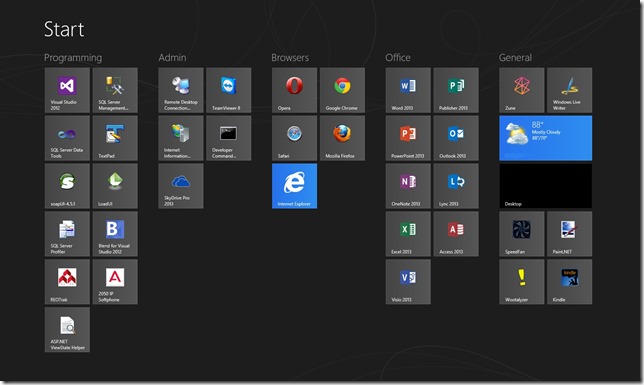Welcome to my hell. Actually, I mean, welcome to my productivity trap.
Many years ago – 8 to be precise – I made the purchase, nay, the investment, in good office furniture. I ordered from Staples’ business collection, the Bush Cubix series. Not so long ago, I revisited that purchase and was utterly shocked that I had spent nearly $500 on two pieces of furniture: a 60” desk and a bookcase.
However, as time has proven, you get what you pay for. This furniture has been excellent despite the fact that I’ve never taken care of it at all. But all that is going to change soon. As you can see, my workspace has become a storage space for everything. It has no purpose, and when I sit down at it, I am uninspired and lost.
To begin this change, I spent another $500 on two more pieces from the Cubix collection: a 3-drawer storage unit and a stand for my printer and papers. I can’t get the hutch and locker yet. Someday… But, this is going to get the stuff off my desk, giving me a clear view with less distractions. Then once everything is off, I can clean the desk. There are some chips in the finish from a very poor decision I made one night involving a clamp. While bemoaning the fact that my clean desk was still going to be marred, I hit upon an idea that gave me hope and inspiration for the future of my home-office work. That idea is the humble leather desk pad.
Ok, maybe it isn’t humble. In a lot of ways it’s pompous, since it’s a executive thing, but it doesn’t have to be. Look at the current state of my desk. Look at how many things are sitting in front of me. Now imagine a desk pad blocking all that junk. The desk pad says, “No. Not here. This is not storage area, this is creative area.” And that is where I am drawing my inspiration. In the chaos that is my desk right now, the desk pad is going to be a sanctuary of openness. Things enter that sanctuary to be worked on, then are retired to their homes.
Of course, the new furniture is the other part of it. Right now, there is no home for everything on my desk. Also, my files are in a box in the closet off to the side. Because it’s such an annoyance to go to the closet and get the filing box, papers to be filed pile up in my “outbox” on the right side.
Not shown in the picture is my bookcase, which is stuffed full of junk. Yes, there’s books in there, but there’s also spindles of DVDs, envelopes, paper, labels, a drawer organizer with all my office stuff in it, manuals, and some art. Art that is crowded out where it doesn’t even look like art, it looks like junk. So with the addition of my new storage units, I can get the stationary stuff and DVDs out of there. It will give more room for proper display. It will probably kick off another round of downsizing, as I re-evaluate the things I haven’t touched in years.
Since I have at least a week to wait for the new furniture, I have plenty of time to dwell on this, make notes, research and consider different layouts, and write about it all. My home office is also my studio, with a recently-reduced number of keyboards (2), and some guitars. The picture shows the heavily-underutilized rack stand, acting as a printer and mixer stand, with a couple of drawers. I have a couple of torch lamps in the corners that are probably ready to be retired. I can replace them with LED sunlight lamps if needed.
The bottom line is, I need to visualize what I want. And what is it that I want? I don’t host guests in my office. My original layout accommodated stepping between computer and keyboards when recording. Maybe I need something like that again?
And then…
This is my new workspace.
The desk is no longer against the wall, it is now in the center of the room. One of the biggest things this relocation did for me is put the ceiling light directly over the desk. Now I am not backlit while at the desk and my keyboard doesn’t suffer from being completely shadowed.
As mentioned, I now have a three desk storage unit to hold all my desk pieces and files. I have a printer stand that has taken a lot of clutter off of my bookshelf. My bookshelf is now in front of me, where I can put some more artful items. Although the pictures don’t show it, I also have shelves on the wall. I now have more shelf space than pieces to put on them.
And in the center of the desk is the desk pad. I have used this just as I describe. It is a clear space (except when the cat feels like being the center of attention). I bring items into that space: bills, letters, computer parts, whatever. I do the work and clear it out. And as with my new tool kit, there is a place for everything. I do have a junk drawer, which will need to be addressed, but that also means that everything in it needs to receive a designated place.
Has it helped my productivity? I think it’s a little early to tell. I am happy for all these changes, but honestly, it did not cause a huge change in motivation. I think I’ve been going though a slight bout of depression, from which I am now recovering. If that’s what it was, then it’s good I’m coming out of it into a more organized living area which will be receptive to creation.


